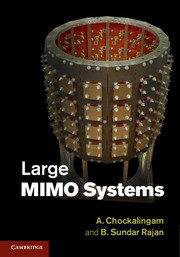Book contents
- Frontmatter
- Dedication
- Contents
- Preface
- Acknowledgments
- Abbreviations
- Notation
- 1 Introduction
- 2 Large MIMO systems
- 3 MIMO encoding
- 4 MIMO detection
- 5 Detection based on local search
- 6 Detection based on probabilistic data association (PDA)
- 7 Detection/decoding based on message passing on graphical models
- 8 Detection based on MCMC techniques
- 9 Channel estimation in large MIMO systems
- 10 Precoding in large MIMO systems
- 11 MIMO channel models
- 12 Large MIMO testbeds
- Author index
- Subject index
- References
5 - Detection based on local search
Published online by Cambridge University Press: 18 December 2013
- Frontmatter
- Dedication
- Contents
- Preface
- Acknowledgments
- Abbreviations
- Notation
- 1 Introduction
- 2 Large MIMO systems
- 3 MIMO encoding
- 4 MIMO detection
- 5 Detection based on local search
- 6 Detection based on probabilistic data association (PDA)
- 7 Detection/decoding based on message passing on graphical models
- 8 Detection based on MCMC techniques
- 9 Channel estimation in large MIMO systems
- 10 Precoding in large MIMO systems
- 11 MIMO channel models
- 12 Large MIMO testbeds
- Author index
- Subject index
- References
Summary
Local search has grown from a simple heuristic idea into an important and mature field of research in combinatorial optimization [1]. When confronted with NP-hard problems, one can resort to (i) an enumerative method that is guaranteed to produce an optimal solution, or (ii) an approximation algorithm that runs in polynomial time, or (iii) some kind of heuristic technique without any guarantee on the quality of the solution and running time. The first approach of true optimization algorithms may become prohibitive due to the problem of size or the lack of insight into the problem structure. The second approach of polynomial-time approximation algorithms, though characterizable by performance bounds, may give inferior solutions. The third approach of heuristics is the preferred choice for NP-hard problems, as it provides a robust means to obtain good solutions to problems of large size in a reasonable time. Local search techniques come under the third approach. Optimum signal detection in MIMO systems involves the minimization of a certain cost over a discrete signal space, where the exhaustive enumerative approach becomes prohibitive when the number of signaling dimensions becomes large. Therefore, the local search approach can be a considered choice for signal detection in MIMO systems with a large number of antennas.
An important characteristic of a local search algorithm is its neighborhood function/definition which guides the search to a good solution.
Information
- Type
- Chapter
- Information
- Large MIMO Systems , pp. 62 - 109Publisher: Cambridge University PressPrint publication year: 2014
